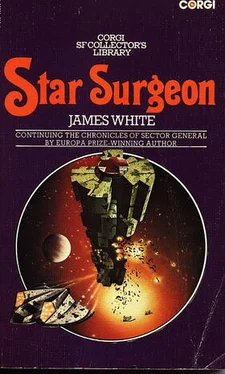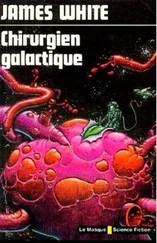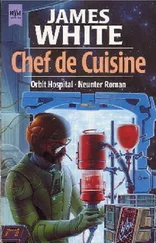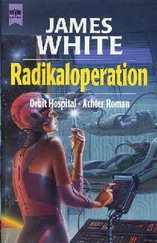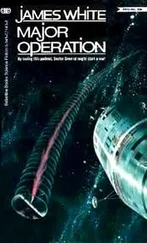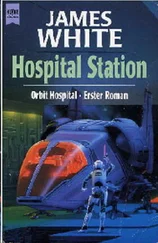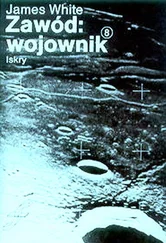Conway felt his neck getting warm. He let the dig about Williamson pass and said, “I thought we might leave the place empty for them.”
“No,” said O’Mara dryly. “It has too much sentimental, monetary and strategic value. We hope to keep a few levels operating for the treatment of casualties sustained by the defending force. Colonel Skempton is already at work on the evacuation problem and will help you all he can. What time is it by you, Doctor?”
Conway told him that when he had left Vespasian it had been two hours after breakfast.
“Good,” said O’Mara. “You can contact Skempton and go to work at once. With me it is long past bedtime, but I’ll sleep here in case you or the Colonel want something. Goodnight, Doctor.”
So saying he took off and folded his tunic, stepped out of his shoes and lay down. Within seconds his breathing became deep and regular. Suddenly Conway laughed.
“Seeing the Chief Psychologist lying on his own couch,” Conway said through his laughter, “is something of a traumatic experience. I very much doubt, sir, if our relationship will ever be quite the same …
As he was leaving O’Mara murmured sleepily, “I’m glad. For a while there I thought you were going all melancholy on me …
Seven hours later Conway surveyed his littered desk wearily but with a measure of triumph, rubbed his eyes and looked across at the desk facing his. For a moment he felt that he was back on Etla and that a red-eyed Major Stillman would look up and ask what he wanted. But it was a red-eyed Colonel Skempton who looked up when he spoke.
“The breakdown of patients to be evacuated is complete,” Conway said tiredly. “There are divided first into species, which will indicate the number of ships required to move them and the living conditions which must be reproduced in each ship. With some of the weirder types this will necessitate structural alterations to the vessels, which will take time. Then each species is sub-divided into degrees of seriousness of the patient’s condition, which will determine the order of their going …
Except, thought Conway sourly, when a patient’s condition was such that to move it would endanger its life. In which case it would have to be evacuated last instead of first so that treatment could be prolonged as much as possible, which meant that specialized medical staff who themselves should have been evacuated by that time would be held back to treat it, and by that time its life might be endangered by missiles from an Empire warship anyway. Nothing seemed to happen in a tidy, consecutive fashion anymore.
… Then it will take a few days for Major O’Mara’s department to process the medical and maintenance staff,” Conway went on, “even though he just has to ask them a few questions under scope. When I arrived I expected the hospital to be under attack already. At the moment I don’t know whether to plan for a panic evacuation within forty-eight hours, which is the absolute minimum time for it and which would probably kill more patients than it would save, or take my time and plan for a merely hurried evacuation.”
“I couldn’t assemble the transport in forty-eight hours,” said Skempton shortly, and lowered his head again. As Chief of Maintenance and the Hospital’s ranking Monitor officer the job of assembling, modifying and routing the transports devolved on him, and he had an awful lot of work to do.
“What I’m trying to say,” Conway said insistently, “is how much time do you think we’ve got?”
The Colonel looked up again. “Sorry, Doctor,” he said. “I have an estimate which came in a few hours ago …” He lifted one of the top layer of papers on his desk and began to read.
Subjecting all the known factors to a rigid analysis, the report stated, it appeared likely that a short time-lag would occur between the point at which the Empire discovered the exact position of Sector General and the time when they acted on this information. The initial action was likely to be an investigation by a scout ship or a small scouting force. Monitor units at present stationed around Sector General would attempt to destroy this force. Whether they were successful or not the Empire’s next move would be more decisive, probably a full-scale offensive which would require many days to mount. By that time additional units of the Monitor Corps would have reached the area.
Say eight days,” Skempton concluded, “or three weeks if we’re lucky. But I don’t think we’ll be lucky.”
“Thank you,” said Conway, and returned to work.
First he prepared an outline of the situation for distribution to the medical staff within the next six hours. In it he laid as much stress as possible on the necessity for a quick, orderly evacuation without overdoing it to the extent of causing a panic, and recommended that patients be informed via their physicians so as to cause the minimum distress. In the case of seriously ill patients the doctors in charge should use their discretion whether the patient should be told or evacuated under sedation. He added that an at present unspecified number of medical staff would be evacuated with the patients and that everyone should be prepared to leave the hospital at a few hours notice. This document he sent to Publications for copying in print and tape so that everyone would be in possession of the information at roughly the same time.
At least that was the theory, Conway thought dryly. But if he knew his hospital grapevine the essential data would be circulating ten minutes after it left his desk.
Next he prepared more detailed instructions regarding the patients. The warm-blooded oxygen-breathing life-forms could leave by any of several levels, but the heavy-G, high-pressure species would pose special problems, not to mention the light-gravity MSVKs and LSVOs, the giant, water-breathing AUGLs, the ultra-frigid types and the dozen or so beings on Level Thirty-eight who breathed superheated steam. Conway was planning on the operation taking five days for the patients and an additional two for the staff, and for this rapid clearing of the wards he would have to send people through levels foreign to them to reach their embarkation points. There would be possible oxygen contamination of chlorine environments, danger of chlorine leaking into the AUGL wards, or of water flooding all over the place. Precautions would have to be taken against failure of the methane life-forms’ refrigerators, breakdown of the antigravity equipment of the fragile, bird-like LSVOs and rupture of Illensan pressure envelopes.
Contamination was the greatest danger in a multi-environment hospital-contamination by oxygen, chlorine, methane, water, cold, heat or radiation. During the evacuation the safety devices usually in operation- airtight doors, double, inter-level locks, the various detection and alarm systems-would have to be overridden in the interests of a quick getaway.
Then staff would have to be detailed to inspect the transport units to ensure that their passenger space accurately reproduced the environment of the patients they were to carry.
All at once Conway’s mind refused to take any more of it. He closed his eyes, sank his head into the palms of his hands and watched the afterimage of his desktop fade slowly into redness. He was sick of paperwork. Since being given the Etla job his whole life had been paperwork; reports, summaries, charts, instructions. He was a doctor currently planning a complicated operation, but it was the sort of operation performed by a high-level clerk rather than a surgeon. Conway had not studied and trained for the greater part of his life to be a clerk.
He stood up, excused himself hoarsely to the Colonel and left the office. Without really thinking about it he was moving in the direction of his wards.
Читать дальше
